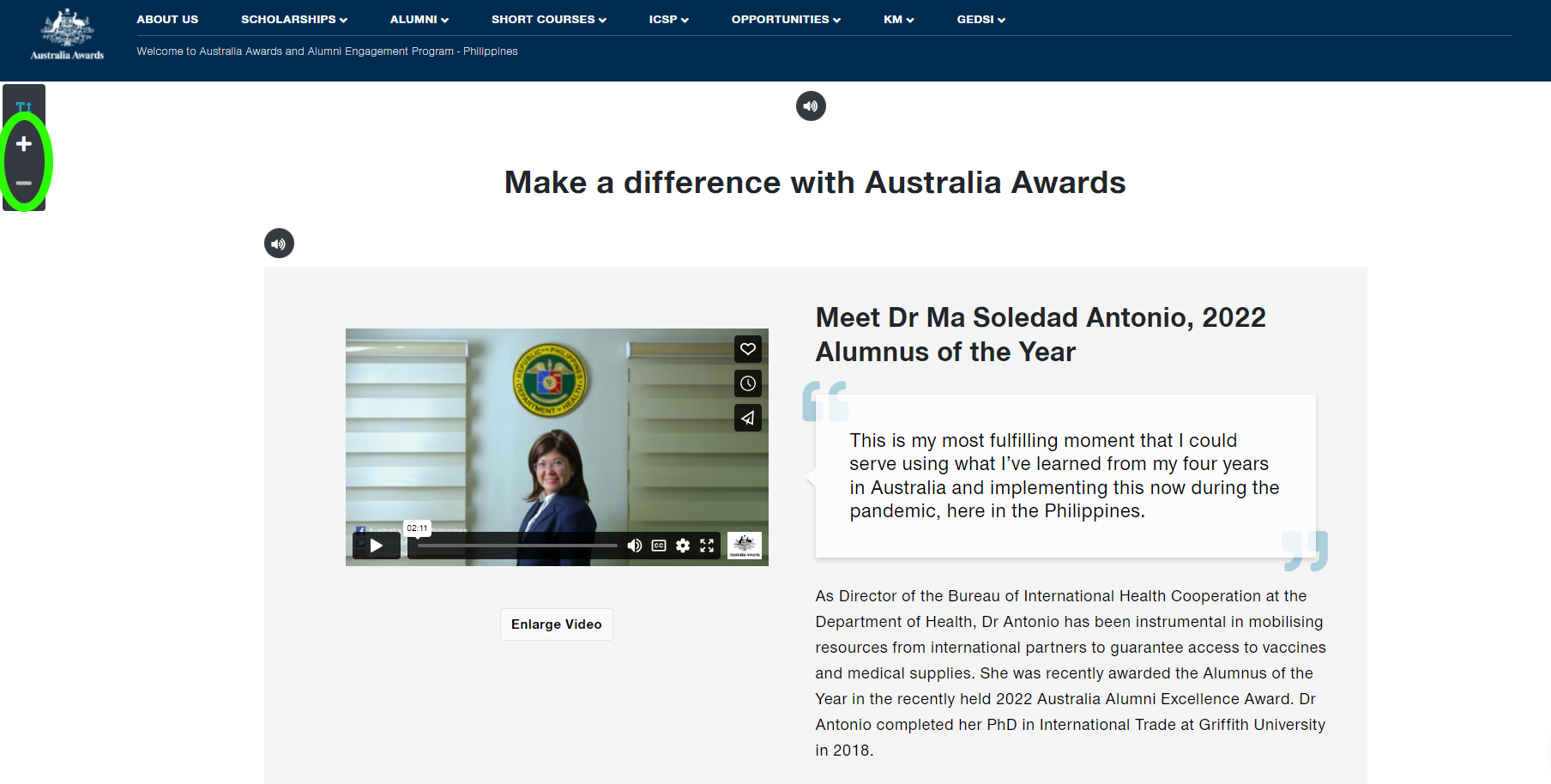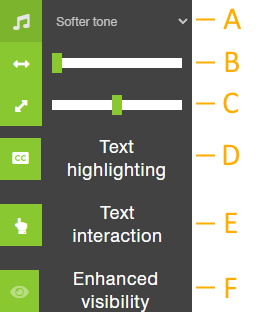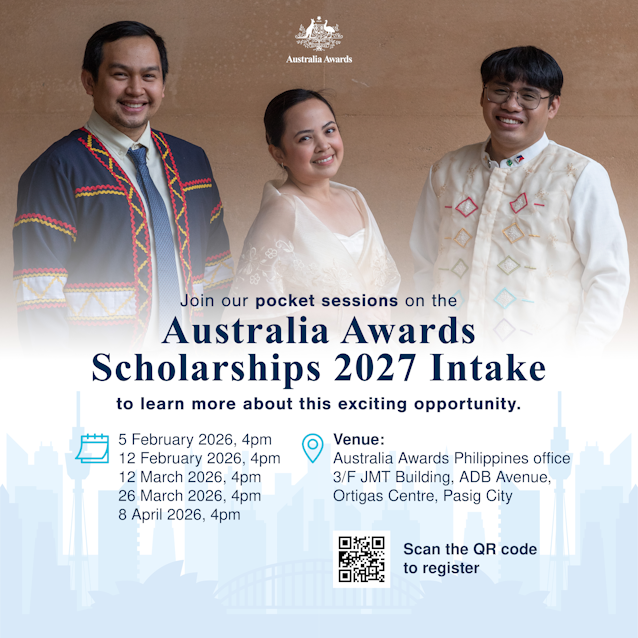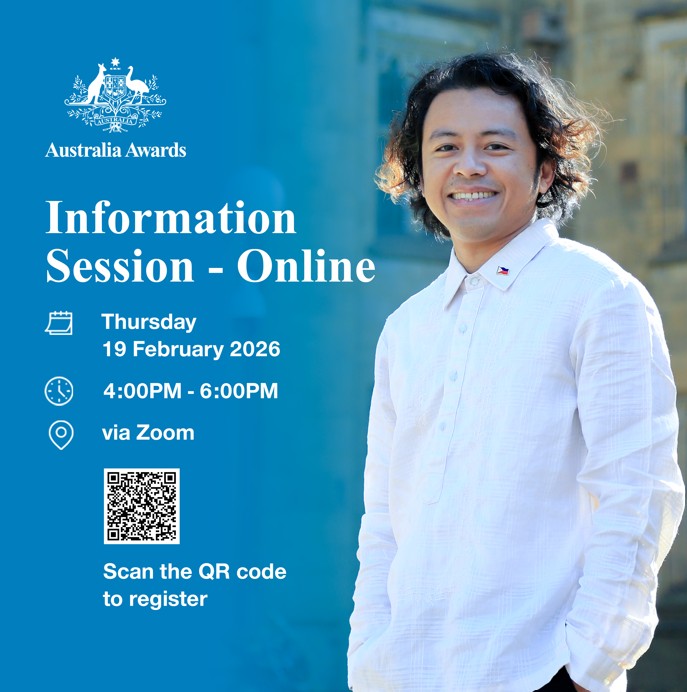Applicants for Open Category

Applications for Australia Awards Scholarships 2027 intake are now open
Applications for the 2027 intake will be received from 1 February until 12NN Philippine time on 30 April 2026.
Overview / Important Dates
Applications for Australia Awards Scholarships are open from 1 February - 30 April every year.
FEBRUARY - APRIL
ONLINE APPLICATION
If your application is shortlisted, you will be notified for an interview. And if you pass the interview, you will be given a provisional priority status. This means you are now a candidate for the scholarship.
MAY - JUNE
SCREENING OF APPLICANTS
If your application is shortlisted, you will be notified for an interview. And if you pass the interview, you will be given a provisional priority status. This means you are now a candidate for the scholarship.
JULY
PANEL INTERVIEW
If your application is shortlisted, you will be notified for an interview. And if you pass the interview, you will be given a provisional priority status. This means you are now a candidate for the scholarship.
AUGUST
SELECTION OF CANDIDATES
If your application is shortlisted, you will be notified for an interview. And if you pass the interview, you will be given a provisional priority status. This means you are now a candidate for the scholarship.
AUGUST - NOVEMBER
PRE-MOBILISATION ACTIVITIES
After successfully completing the interview, there are three things that you need to take note of:
First, submit the result of your English proficiency exam to the Australia Awards secretariat to facilitate your application to your chosen university.
Next, you need to receive an acceptance from an Australian university. The secretariat will assist you in coordinating with your chosen university regarding your application and acceptance.
Once you are accepted in the university, the secretariat will assist you in applying for a student visa.
During pre-mobilisation, you will be required to attend two events: Course Counselling, which will help you finalise your program and university, and Pre-Departure Briefing, which prepares you for your life as a scholar in Australia.
JANUARY
MOBILISATION

ON-AWARD
Upon arriving, Australia Awards scholars undergo an Introductory Academic Program or IAP, which provides scholars with support during their first weeks in Australia and prepare them for their new life as scholars.
The duration of the scholars’ masters program is from one year to eighteen months, while PhD program is up to four years. During this time, we encourage you to participate in on-award enrichment activities, join Filipino clubs, and experience life in Australia outside the university to get the most of this once-in-a-lifetime opportunity.

RETURN-REAP
After finishing your degree, you are now equipped to implement your re-entry action plan (REAP) in the Philippines. The secretariat will assist you on your re-integration and REAP implementation through a REAP Conference and Workshop.
You will be required to provide updates on your REAP implementation through REAP progress and REAP dialogue events.
Upon your return, you will also be a part of the vibrant Australia Global Alumni community in the Philippines.
Who Can Apply?
Eligibility Requirements
Applications are strongly encouraged from ALL eligible citizens of the Philippines (regardless of age, gender, ethnicity or disability) who meet the program’s eligibility criteria, especially these Philippines-specific criteria:
1
At least 2 years of cumulative professional work experience
2
In a position where skills can be used to effectively contribute change in the Philippines
3
Have resided in the Philippines for at least 12 months upon application
4
Has a Re-Entry Action Plan (REAP) that contributes to Philippine development
How to Apply?
Online Application
1
Find out if you’re eligible.
Get assessed by answering these eligibility questions. Once you pass the eligibility criteria, you will receive a link to the online application form to begin your scholarship application.
2
Fill out the online scholarships application form.
After receiving the link to the application form, fill it out with your personal information, educational background, and professional experience. Additionally, you must also include the following in your application:
A. Encode your Re-Entry Action Plan (REAP)
A REAP outlines how you intend to use the competencies you will acquire in Australia to contribute to Philippine development. The online application form includes a section on REAP. Make sure you complete this section.
B. Upload the required documents
Upload these documents as PDF files in the application form with the tab, "Upload Documents.”. Failure to do so will render your application ineligible.
- Proof of citizenship
- A scanned copy of your valid passport or birth certificate from PSA.
- Proof of Residency
- A scanned copy of any of the following documents that clearly show your current address: Government issued ID with address, Employment certificate indicating tenure, Barangay certificate, Property lease or rental contract, Recent bank statements, utility bills, or credit card bills (dated within one month of application)
- Certificate of General Weighted Average (GWA) or Grade Point Average (GPA) of your Bahelors Degree
- Obtain this from the academic institution where you completed your bachelors degree.
The templates / sample for these documents can be accessed through the Resources page in the website.
Ensure you complete your application by uploading the two required documents. Failure to do so will result in your application being deemed ineligible.
3
Finalise and Submit your application
You can fill out this application form in stages. Save your entries and return later to complete your application at your own pace. Take advantage of this feature to ensure your information is accurate and complete. Once everything is finalized, click the “Finalise and Submit” button to submit your application. Note that only finalized submission will be assessed.
Deadline of applications for the 2027 intake is on 30 April at 12NN Philippine time.
- This application form is a confidential document between the applicant and the Australia Awards - Philippines. DO NOT share this secured edit link that was sent to your email with any individual or organisation.
- Australia Awards Scholarships adheres to the Philippine Government’s Data Privacy Act of 2012 and its implementing rules and regulations, and complies with the Australian Government’s Privacy Act 1988.
- This application form must be accomplished in English.
- Be sure to use only major internet browsers (Mozilla, Chrome, Edge, Safari)
- This application form may be filled out in stages. You may save your entries and return at a later time to complete your application. Save as you go. In each section there is a “save” button. Use that in each section. Be sure to save every 5 minutes to ensure that your latest input are transmitted to our server.
- We only accept documents in PDF format. Please ensure that all documents that are required to be submitted are in PDF format.
- There are sections in the application where you can see word count at the bottom of the field. These are maximum word count. Your entries will not be accepted unless they are within the word count limit.
- If you have already applied in the last 3 years, the system will not allow you to create another profile. You may use the old link you used to edit your application below. It was sent to your email. Or if you no longer have a copy, contact our helpdesk to retrieve your previous profile by filling out this form: https://dev.australiaawardsphilippines.org/forms/retrieve-application-link. If you have very urgent concern regarding errors on the form, you may send an email to aaaep.helpdesk@gmail.com
If you’re interested to start a journey with us, watch this video for more guidance on applying for an Australia Awards Scholarship.
Priority Fields of Study
Make sure your REAP is aligned with the shared development priorities of Australia and the Philippines.
These documents are important resources in developing your application for Australia Awards and making sure your Re-Entry Action Plan (REAP) is aligned with the priority areas of Australia and the Philippines.

Agriculture, Marine, and Natural Resource Management

Agriculture, Marine, and Natural Resource Management
Climate Change (including Humanitarian Action and Disaster Risk Reduction)
Climate Change (including Humanitarian Action and Disaster Risk Reduction)

Cybersecurity and Critical Technology

Cybersecurity and Critical Technology

Education

Education
International Relations and National Security
International Relations and National Security
Gender Equality, Disability, and Social Inclusion
Gender Equality, Disability, and Social Inclusion

Governance and Public Policy

Governance and Public Policy

Health

Health
Law and Justice
Law and Justice
Maritime Policy, Maritime Security, and Law of the Sea
Maritime Policy, Maritime Security, and Law of the Sea

Mining and Energy

Mining and Energy

Peace and Development

Peace and Development

Trade and Economics

Trade and Economics
You may select any university in Australia. Please visit http://cricos.education.gov.au/ to search for courses and universities.
You may also refer to www.australian-universities.com/list for a list of Australian universities.
Scholarship Inclusions
Benefits and Entitlement

Roundtrip airfare

Roundtrip airfare

Full tuition fees

Full tuition fees

Contribution to living expenses

Contribution to living expenses

Introductory academic program

Introductory academic program

Overseas student health coverage

Overseas student health coverage

Supplementary academic support

Supplementary academic support

Fieldwork allowance*
*for research students

Fieldwork allowance*
*for research students

One-off establishment allowance on arrival

One-off establishment allowance on arrival

Pastoral Care

Pastoral Care

Disability Support

Disability Support
Australia Awards Scholarships recipients receive full scholarships for the minimum period necessary to complete their academic program as specified by the university, including any preparatory training.
Panel Interview
If your application is shortlisted, the Australia Awards Secretariat will schedule you for a panel interview. Watch this video for guidance on how to prepare for this important step in the application process.
Applications for Australia Awards Scholarships are open from 1 February - 30 April every year.
What is the REAP?
The REAP is an important requirement that you need to accomplish to make it to the Australia Awards program.
Re-Entry Action Plan (REAP)
A REAP outlines how you intend to use the competencies you will acquire in Australia to contribute to Philippine development.
REAP Proposal
Here are some key points to consider in your REAP proposal:

Relevance
1
Responsive to the opportunity or problem of the host organisation
2
Responsive to Gender Equality, Disability and Social Inclusion (GEDSI)

Relevance
1
Responsive to the opportunity or problem of the host organisation
2
Responsive to Gender Equality, Disability and Social Inclusion (GEDSI)

Alignment
1
Aligned to the priority fields of study
2
Aligned to the Philippine Development Plan 2023 - 2028 and the Australia’s Aid Plan in the Philippines

Alignment
1
Aligned to the priority fields of study
2
Aligned to the Philippine Development Plan 2023 - 2028 and the Australia’s Aid Plan in the Philippines

Implementability
1
REAP should be implemented within 1-2 years upon scholar’s return
2
Strategy for resources and financial support

Implementability
1
REAP should be implemented within 1-2 years upon scholar’s return
2
Strategy for resources and financial support

Innovativeness
1
Could also be an improvement of a current system
2
Features new methods; advanced and original

Innovativeness
1
Could also be an improvement of a current system
2
Features new methods; advanced and original

Sustainability
1
Gains of the REAP i.e. output will be used and can be institutionalized

Sustainability
1
Gains of the REAP i.e. output will be used and can be institutionalized
Watch the video below for a step-by-step guide on how to fill out the REAP proposal section in the online application form. You may also download this Annotated REAP as your reference.
The program values gender equality, disability and social inclusion (GEDSI). Watch this video for tips in developing a GEDSI lens in designing your REAP.
REAPs in Action

Australia is a benchmark for PAGASA in terms of equipment, experts, trainings, and weather information services. We can learn a lot from what Australia has been doing. My Master’s degree in Environmental Science deepened my knowledge not only of the atmosphere-ocean interaction but also the social, economic and ecological impacts.
Jorybell Masallo
Master of Environmental Science
Philippine Atmospheric, Geophysical, and Astronomical Services Administration

Thanks to my studies in Australia, I was able to make sound decisions for our school especially now as a new principal.
Fritchie Bayron
Master of Education, Monash University
Moriah Christian School for Young Learners
Enlarge Video
My REAP is the first asphalt road in the Philippines made with plastic bags and constructed in a heavy traffic national road.
Neilsen Campit
Master of Environment and Sustainability, Monash University
Department of Public Works and Highways

C&C is a convergence of my REAP and the vision of what I want to do in my life. The dream of running a socially-centered business started when I was still in college, the whole experience of studying in Melbourne gave me the business tools and technical know-how, and it was the REAP that crystalised and validated my dream to jumpstart C&C.
Monica Co
Master of Environment and Sustainability, Monash University
Department of Public Works and Highways

As a special educator, it is truly fulfilling to empower my former and current deaf students to become problem-solvers and entrepreneurs through my REAP: the Deaf Entrepreneurship Program. With the education I gained from the Australian Graduate School of Entrepreneurship at Swinburne University of Technology, I am able to teach them the basic competencies needed to build a business.
Ross Ann Capalit
Agusan National High School
Master of Entrepreneurship and Innovation
Swinburne University of Technology
Enlarge Video
Applicants Microlearning Video - How to Write a REAP Objective
Enlarge Video
Applicants Microlearning Video - How to choose postgraduate course
Enlarge Video
Applicants Microlearning Video - How to Determine a Problem or Opportunity in Host Organisation
Enlarge Video
Applicants Microlearning Video - How to incorporate GEDSI in the REAP
When is the opening of applications?
When will the results of the assessment and panel interviews be released?
What are open and targeted categories and which should I apply for?
What government agencies fall under the targeted category?
- Civil Service Commission (CSC)
- Department of Budget and Management (DBM)
- Department of Foreign Affairs (DFA)
- Department of Interior and Local Government (DILG)
- Department of Public Works and Highway(DPWH)
- Department of Social Welfare and Development (DSWD)
- Department of Transportation (DoTr)
- Department of Trade and Industry (DTI)
- Department of Economy, Planning and Development (DEPDEV)
- Philippine Competition Commission (PCC)
- Public-Private Partnership Center (PPP)
Permanent and regular employees of the following agencies must go to their HR to apply to the program. Contractual employees can apply under the open category.
I already have a PhD. Can I still apply for a masters program?
Is there a limit to the number of times I can apply?
Do you offer scholarship for undergraduate programs?
Should my proposed course be in the field I previously studied?
Applicants, whose interest is in a course different from his/her bachelor’s degree, can still be considered depending on their relevant work experience and career goals. In the application form, applicants must demonstrate how they would use the knowledge and skills they would gain from study program to implement their Re-Entry Action Plans (REAPs).
What are the types of courses available for study under the scholarship?
For the open category, all proposed study should align with the following priority areas here.
Where can I get information about courses and universities in Australia?
You may select any participating university in Australia. Please visit https://cricos.education.gov.au to search for courses and universities. You may also refer to www.australian-universities.com/list for a list of Australian universities. Note that currently, scholarship awards in the Philippines only support postgraduate programs.
What are the eligibility requirements to apply for the Australia Awards Scholarships?
Click on the eligibility section of the website for a full description of the eligibility criteria.
Do I need to get accepted by an Australian university first before I apply for the scholarship?
No. You should not apply directly to universities in Australia. The Australia Awards Scholarships secretariat will assist in placing you once you are awarded with the scholarship.
What if I am a Filipino permanently/temporarily residing abroad, am I qualified to apply for the Australia Awards Scholarships?
No. To be eligible for the scholarship, applicants must be residing in the Philippines at the time of their application.
Does program have an age limit?
There is no age limit.
What if I have an offer letter from a university in Australia, am I still qualified to apply for the scholarship?
Yes. However, an offer letter from a university in Australia is not a requirement for the Australia Awards Scholarships and is not a guarantee that the applicant shall be awarded a scholarship.
What are the work experience requirements?
You must have cumulative professional work experience of at least 2 years. Your current or immediate past employment must be in the Philippines. On-the-Job-Training (OJT), internships and volunteer work will not be credited to work experience. Any probation period will be included as part of the two-year calculation.
Does the 2-year work experience have to be with the same employer?
No. Work experience does not have to be continuous or with the same employer.
Can a self-employed individual apply for a scholarship?
Yes, as long as you meet the requirements of the scholarships.
Can I apply for the Australia Awards even if I have had another scholarship previously?
Yes. Applicants must have completed all obligations to their previous scholarship upon application.
Can I apply for another scholarship at the same time as applying to the Awards?
Yes.
The duration of my desired program of study is more than the allowed by the Awards. Can I still apply for the scholarships?
Yes. You would need to apply for credit to reduce the time required for you to achieve the qualification through the Recognition of Prior Learning (RPL). This is done once the secretariat confirms that you have passed the interview. You would need to submit additional documents (e.g., description of work experience from your current/past employers, certification of courses taken, etc.) to support this request for RPL.
Do I need to submit IELTS or TOEFL or PTE results during application?
Applicants are not required to submit English proficiency certification during application.
However, this will be required after you passed the initial screening and interview.
English certification can be IELTS, TOEFL or PTE.
Do I need to submit my university TOR during application?
Applicants are required to submit a graduate certificate with GWA/GPA (see sample under Resources tab) of their bachelors degree.
Do I need to submit evidence of work experience upon application?
No. However, universities may require candidates to show evidence of relevant work experience during the placement period.
What if I have an offer letter from a university in Australia, do I still need to submit an English proficiency test result?
Yes. However, please note that result of the English proficiency test is not required during the initial application. It will be required only if you passed the interview.
I am working in public sector. Do I need to obtain an endorsement from our scholarship committee/head of agency?
Applicants from non-partner government organisations need not obtain an endorsement on initial application. Endorsements are only required after the secretariat confirms that you passed the interview.
Can I work while I am studying in Australia?
Yes, scholars are allowed to work part-time (up to 20 hours per week).
What are the obligations of a Filipino awardee?
Successful candidates are required to return to the Philippines for at least two years after completion of the scholarship to contribute to the development of the country through his/her REAP.
What are the responsibilities of the awardees while studying in Australia?
Before awardees take up an offer of a scholarship, they will need to enter into a signed scholarships contract with the Australian Government. This contract will contain detailed information about awardee responsibilities. This condition is indicated in the Scholarships Handbook.
Can a Filipino awardee bring his/her family to Australia?
Yes, awardees may bring their family members (spouse/partner and children below 18 years old) to Australia as dependents. However, dependents can only join awardees in Australia 3 months after the awardee commences his/her scholarship. Please note that the Australian Government does not provide any financial or other support for the dependents.
Can I implement my REAP in a private organisation?
REAPs implemented in a private organisation must be under the Corporate Social Responsibility (CSR) program.
How long is the implementation of the REAP?
The REAP should be completed within 1-2 years upon the return of the awardee.
When do I need to acquire the signature of the head of the host organisation for the REAP?
Applicants must obtain sign-off from the host organisation after the secretariat confirms that they are shortlisted for interview.
Will Australia Awards be granting financial help in implementing the REAP?
No, the program will not be granting financial help in the implementation of the REAP. However, awardees are allowed to look for alternative funding from other organisation or institution.
Can a scholar who is deaf use FSL (Filipino Sign Language) while studying in Australia?
No. Australian universities will provide support to awardees who are deaf learn the Australian sign language.
Can disability support persons work while in Australia?
No, their work is to care for the scholar full-time.
Do you screen the disability support person?
Yes. The scholar will recommend his/her preferred disability support person. The preference is a close relative who is 21 years and above. However, this will be assessed by the Australia Awards Disability Support Advisor.
Is it required for all PWDs to have a disability support person?
No. Australia Awards will assess if a disability support person is required for a scholar with disability.
Do you have specific courses/programs for PWDs?
No. Scholars will need to align their chosen programs and REAPs with the priority areas for the specific intake they are applying for.
Does Australia Awards provide housing that is PWD-friendly?
The Australia Awards and the awardee’s chosen Australian university will help the scholar look for accommodations that fits his/her need.
For Applicants
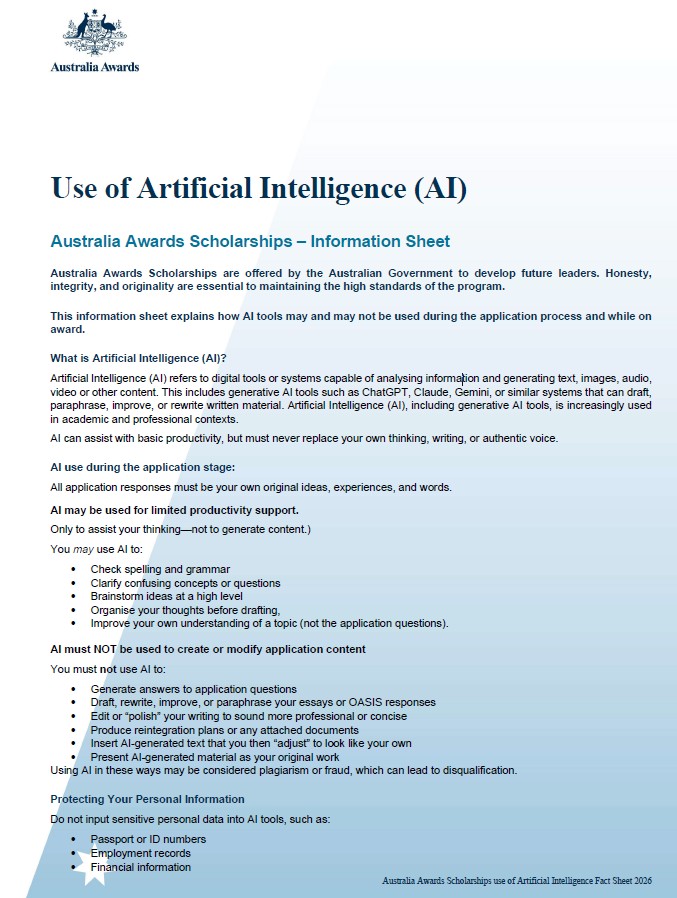
Use of Artificial Intelligence (AI)

Use of Artificial Intelligence (AI)

AAS Application Process Infographics

AAS Application Process Infographics

Australia Awards Brochure

Australia Awards Brochure

REAP Form Annotated for Applicants - Word Format

REAP Form Annotated for Applicants - Word Format

REAP Form Annotated for Applicants.pdf

REAP Form Annotated for Applicants.pdf

Sample Certifications of GPA or GWA - Various Universities

Sample Certifications of GPA or GWA - Various Universities
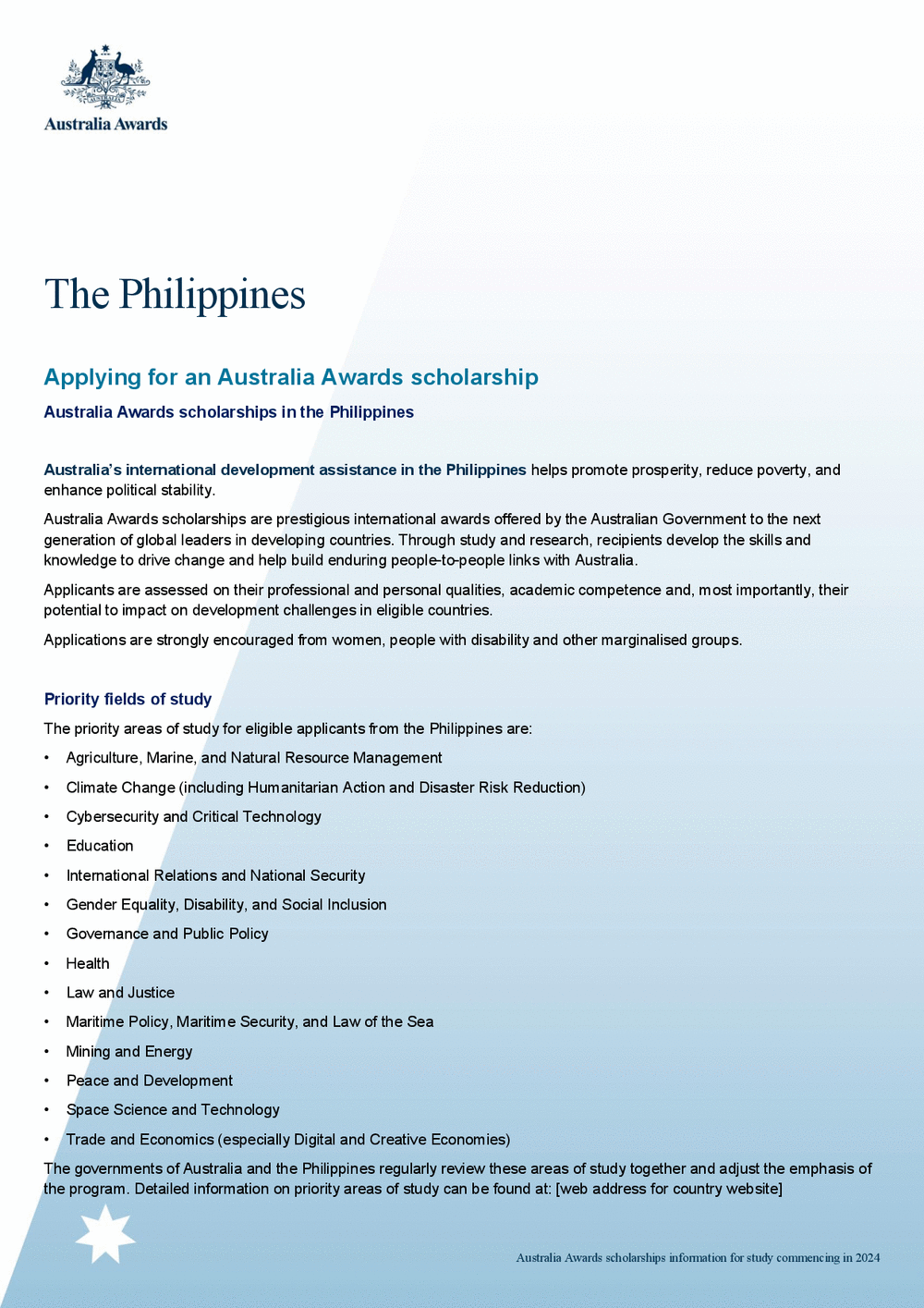
Australia Awards Country Profile

Australia Awards Country Profile

AAS Guidebook for Dependents of Filipino Scholars

AAS Guidebook for Dependents of Filipino Scholars

Australia Awards Scholarships Policy Handbook 2022

Australia Awards Scholarships Policy Handbook 2022
For Mentors

Sample Mentoring Agreement

Sample Mentoring Agreement

For Partner Organisations

AAS Guide for Targeted Category

AAS Guide for Targeted Category
